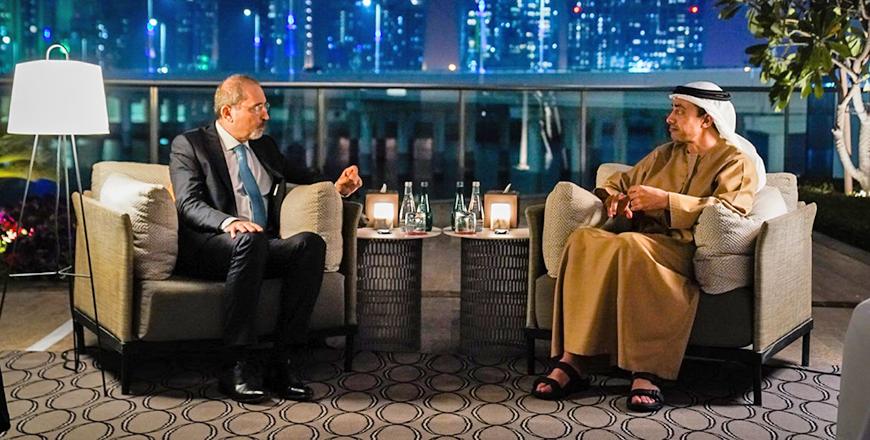- Local News
- Friday-2021-02-05 | 08:12 pm

Nayrouz News Agency :
Deputy Prime Minister and Minister of Foreign Affairs Ayman Safadi on Thursday met with UAE Foreign Minister Sheikh Abdullah Bin Zayed Al Nahyan.
The two sides discussed bolstering cooperation and "expanding its horizons” in various fields, in accordance with the directives of the two countries’ leaders to strengthen the historical fraternal relations that bind the two countries, according to a Foreign Ministry statement.
The ministers reviewed the outcomes of the meeting between His Majesty King Abdullah and Sheikh Mohammed Bin Zayed Al Nahyan, the crown prince of Abu Dhabi, last month, and steps for translating them into practical achievements, in service of their common Arab interests, the statement said.
They stressed the continuation of joint efforts to combat the coronavirus pandemic and its ramifications.
Safadi expressed appreciation for the stance of the United Arab Emirates in supporting Jordan in the face of economic challenges, thanking Sheikh Abdullah for the generous care that the UAE provides to Jordanian expatriates.
Discussing regional developments and efforts exerted to resolve crises and end tensions in the region on foundations that ensure security and stability, they underlined the importance of promoting joint Arab action in facing common challenges, protecting Arab interests and preventing foreign intervention in Arab affairs.
In regard to foreign intervention, Sheikh Abdullah indicated that it creates "a fertile environment” for extremism, terrorism and hate speech, which would undermine the efforts made to establish security and stability in the region, according to the statement.
Emphasising Arab joint action, the two ministers discussed preparations for the extraordinary meeting of the Council of Foreign Ministers of the Arab League, which will be held in Cairo on February 8.
Both sides agreed on the centrality of the Palestinian cause and the need to intensify efforts to relaunch "serious and effective” negotiations to achieve a just and comprehensive peace based on the two-state solution that guarantees the establishment of an independent and sovereign Palestine, living in peace alongside Israel, with East Jerusalem as the Palestinian capital on the lines of June 4, 1967 in accordance with international law, approved references and the Arab Peace Initiative.
Reviewing the efforts exerted to reach a political solution to the Syrian and Libyan crises, both stressed the necessity to activate a collective Arab role to preserve the unity of Syria and Libya, restore their security, stability, rid them of terrorism and end foreign intervention.
Condemning the terrorist attacks carried out by the Houthi militia against Saudi Arabia, the two ministers also highlighted the importance of ending the crisis in Yemen and implementing the Riyadh Agreement.
They voiced the support of Jordan and the UAE for the efforts made by the Iraqi government towards stability, safeguarding security and sovereignty to meet the aspirations of the Iraqi people.
The two ministers stressed the need to end the tension in the Arab Gulf region through a dialogue that ensures good-neighbourliness based on the principle of non-interference in the internal affairs of Arab countries.
Safadi described the security of Jordan and the Arab Gulf states as "one and indivisible”, and that the Kingdom "stands by the brothers” in all the steps they take to safeguard their security, stability and interests, according to the statement.









